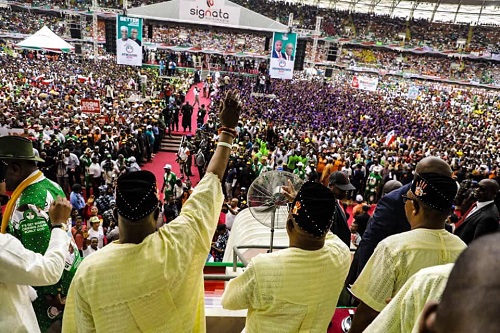FB photo
By
Abba Dukawa
The presidential candidate of the People’s Democratic Party (PDP), Alhaji Atiku Abubakar, itemised his plans on how to get the country working again if elected on February 16.
Atiku revealed his economic rejuvenation plan of the nation with captains of industries and business moguls in Lagos. At the conference entitled ‘Getting Nigeria’s Economy Working: A Pragmatic Approach’ held at Eko Hotels and Towers, Lagos, where Atiku, along with his running mate, Peter Obi, interacted with the business community across the country and professions.
According to him, “Nigeria would have been self-dependent on power since then because it does not need a centralised transmission plan, which is very costly, but a decentralised electricity system where each state or region is powered from the source of energy prevalent in the region. But the president preferred the gas turbines, which I noted was a long term system, as now made obvious.”
PDP presidential Candidate Atiku’s reitreate his pragmatic plans to privatize NNPC, power and other sectors that turned out to be the most attractive aspects of Atiku’s plan to free Nigeria economically was his disclosure to privatise the Nigerian National Petroleum Corporation (NNPC), remaining power and other national assets if elected. This, he said, would help him to stimulate economic growth and also put to an end the reign of mafias in the oil sector.
The former vice president argued that NNPC and the power sector are the two-mafia organisations that must be disbanded through privatization for them to be efficient. He assured the business community of his commitment to privatising the two national assets and others “even if they will kill me.”
He spoke against the observation that the oil and gas sector might well turn out to be the economy’s Achilles heel, in view of the entrenched corruption and resource drain, noting: “Privatising NNPC would be to our advantage. We are not going to lose anything, but rather gain a lot. This, he said, was because in other oil producing countries, government’s revenue from oil is strictly from taxes and not operations.
Atiku dismissed insinuations by the opposition party that if elected as president, he would use his deregulation agenda to enrich his cronies and families, noting, “I am happy that they didn’t say I will use it to enrich myself and families. The fact is, my friends are also entitled to be rich as long as there is no element of corruption there.
During our time, when we privatised several institutions, I have not heard of anybody coming out to accuse either the former president or myself that we took money. The intention of deregulating the economy and giving the private sector the chance to drive it is to bring about prosperity.
So, I don’t consider deregulation of the economy as a threat or a disadvantage. That is why I am strongly supporting restructuring, and to ensure we reduce the size of the Federal Government, if elected in February. I will ensure that I hand over some responsibilities of the Federal Government to other components of government. That is why I am just too impatience to see that the country is restructured.
Waziri Adamawa argued that the current situation in the country has gone beyond wasting resources on assembling another constitutional conference, as there are recommendations from previous ones to work on.
Rather, he said, he would fast track constitution amendment on the issue of citizenship if elected, stressing that Nigeria must de-emphasise the issue of indigeneship and religion in our constitution if we must develop and grow.
On employment, Atiku told the business community that the high rate of unemployment in the country, especially among the youths is a ‘time bomb’ and very scary situation, which he said is responsible for the increasing crime and criminal activities in the country. Other pragmatic approaches to jump-starting the economy he enumerated include attracting more Foreign Direct Investment (FDI) into the non-oil sector, improved diversification and linkages between agriculture, industry and small and medium enterprises (SMEs), improved productivity in agricultural sector and others.
According to him, “Nigeria would have been self-dependent on power since then because it does not need a centralised transmission plan, which is very costly, but a decentralised electricity system where each state or region is powered from the source of energy prevalent in the region. But the president preferred the gas turbines, which I noted was a long term system, as now made obvious.”
Explaining further, Obi noted that attracting increased FDI is dependent on fixing infrastructure, which he said must be private sector-led and not by borrowing, while government provides the guarantees.
To demonstrate that they were not mincing words, Obi noted, “This is first time an aspirant will produce a blueprint for development. It took the current government three years to produce the MTEF, yet they are unable to implement even 30 per cent of it.”
Obi, however, admitted that “nations all over the world make progress on borrowing, but the issue is, what are you borrowing for? Definitely not for consumption, but production. But this government has borrowed N12.7trillion but we can’t see where it is, because it was mostly used for consumption, which is the crisis. The more we borrow the more the GDP drops.”
While reiterating, infrastructure is key for development, Obi said the first measure of development is health, because health is wealth, stating, “Even though this government declared a state of emergency on health, but the budget for the sector in 2019 went down, translating to N5 a day. The proposal for education and health are about N800 billion, whereas over N1trillion is spent on subsidy, consumption. That is the real crisis.”
He said, “The rate of unemployment at 23.1 per cent is the highest ever recorded in the history of Nigeria. The situation is worse for women and young people – with unemployment in the youth population at 33 per cent… by 2050, 40 per cent of the world’s poorest people will be in just two countries: Democratic Republic of Congo and Nigeria. We must take action to avert that.”
He insisted that creating jobs would not be a challenge as he had already employed between 45, 000 to 50,000 people in his private companies, adding, “I will cause a revolution in job creation because the rate of unemployment in Nigeria at present is a time bomb. It is a time bomb that we must quickly address. This is one of the reasons I am impatient to see that the Nigerian economy is deregulated with the hope of addressing some critical challenges confronting us today.”
On corruption, he assured Nigerians that his government would invest heavily in information and communication technology, and automate government processes to reduce human interface with money and government officials, while also instituting greater transparency and efficiency in governance. “The country is more corrupt today than it was yesterday. Once the principal is not corrupt, you would have reduced corruption by 70 per cent. If governance become automated all the toll gates (departments, agencies) will be eliminated
Against this backdrop, Atiku promised to overhaul the education system, noting that government at all levels have relegated education to the background, and sees education as an expense rather have an investment.
Abba Dukawa
A Kano based media practitioner and public commentator for 13 years with many articles published by a number of online mediums and print media.



No Comments Yet!
You can be first to comment this post!